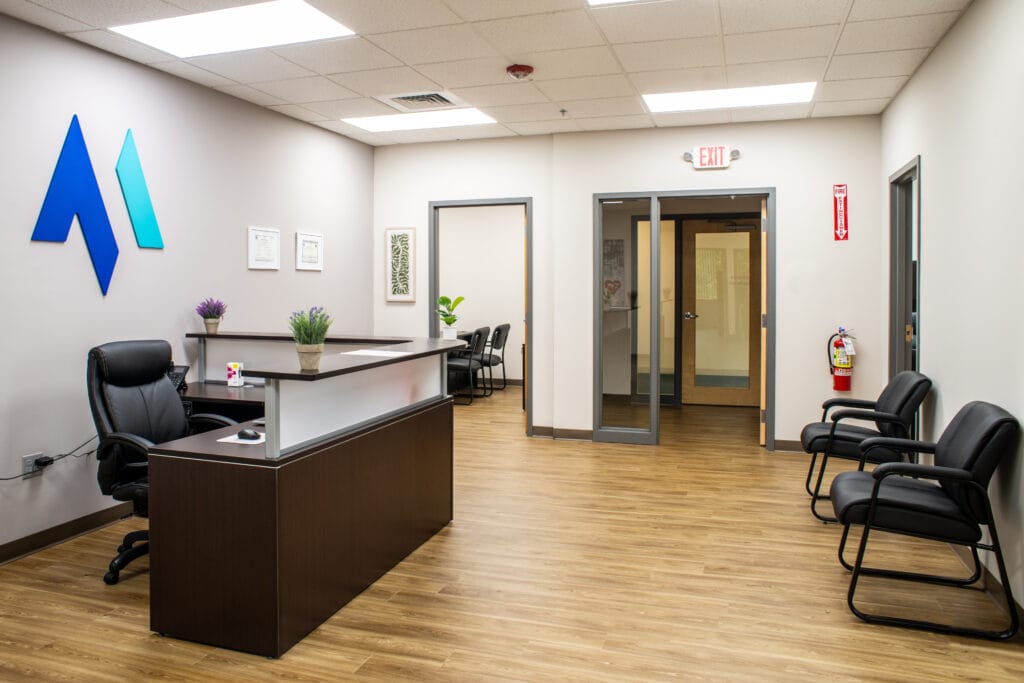
Post-traumatic stress disorder (PTSD) is a serious mental health condition that can arise after experiencing or witnessing a traumatic event. It affects people across all backgrounds and can significantly disrupt daily life and overall well-being. At Meta Addiction Treatment, we are committed to offering compassionate and comprehensive PTSD treatment. We aim to help individuals living with PTSD—guiding them on their journey toward healing and recovery.
PTSD manifests in different forms, depending on how symptoms appear and evolve over time.
Normal stress response PTSD occurs when someone goes through a traumatic experience but gradually recovers with time and support. Temporary symptoms—such as anxiety, sadness, or difficulty concentrating—may arise but typically lessen as the person processes the event.
Acute stress disorder (ASD) involves immediate symptoms following trauma that last for a few weeks. If these symptoms continue beyond a month, a diagnosis of PTSD may be considered.
Uncomplicated PTSD is marked by classic PTSD symptoms like flashbacks, avoidance, and heightened alertness, without other co-occurring mental health conditions.
Complex PTSD (C-PTSD) results from prolonged or repeated trauma, such as childhood abuse or domestic violence. It often leads to profound emotional distress, relationship challenges, and a disrupted sense of self and identity.
Comorbid PTSD occurs when PTSD is present alongside other conditions such as depression, anxiety, or substance use disorders. This form often requires a more integrative approach to treatment.
Each type of PTSD demands a personalized treatment plan, which may include therapy, medication, or alternative healing methods to support lasting recovery and stability.

PTSD extends beyond emotional distress—it can affect nearly every area of a person's life. While its psychological symptoms are well-known, the condition also has substantial physical and social impacts. It alters the body’s stress response system, contributing to symptoms that disrupt relationships, career, and overall health.
Understanding the full range of effects—physical, emotional, and social—is key to effectively managing and treating PTSD.
Though rooted in mental health, PTSD often triggers a host of physical issues. Common symptoms include chronic fatigue, often due to disrupted sleep from nightmares or insomnia. The body may remain in a constant state of alertness, increasing heart rate, muscle tension, and blood pressure. Prolonged exposure to this stress weakens the immune system and raises vulnerability to illness.
Many individuals also experience chronic pain, frequent headaches, or gastrointestinal issues, stemming from the body's persistent release of stress hormones like cortisol. Over time, this state of heightened stress can contribute to more serious conditions such as heart disease, obesity, or autoimmune disorders.
Some people may turn to substances like alcohol, tobacco, or drugs as a coping mechanism, which can further compromise physical health. Without proper treatment and self-care, these physical effects may worsen and diminish quality of life.
Psychologically, PTSD can be profoundly disruptive. Intrusive thoughts, flashbacks, or panic attacks may occur, often triggered by reminders of the trauma. Many individuals experience emotional numbness, finding it difficult to connect with others or feel positive emotions.
Anxiety and depression frequently accompany PTSD, sometimes creating cycles of fear, hopelessness, or despair. Emotional regulation can become difficult, leading to mood swings, irritability, or intense anger. Feelings of guilt or shame—especially if the person blames themselves for the trauma—are also common.
In severe cases, individuals may struggle with suicidal thoughts, overwhelmed by the emotional weight of their experiences. This highlights the critical need for professional support, safe spaces, and consistent care.
PTSD can significantly affect relationships and social engagement. Many people withdraw from loved ones or avoid social settings due to fear, mistrust, or difficulty expressing their emotions. Crowded places, gatherings, or even routine interactions can feel overwhelming or triggering.
This isolation often leads to loneliness, which can further fuel emotional distress. Relationships may suffer as partners, family members, or friends struggle to understand behavioral changes.
In work or school environments, PTSD can impair concentration, stress management, and emotional regulation—leading to decreased performance, missed opportunities, or even job loss. This can reinforce feelings of failure or disconnection.
Additionally, the stigma surrounding PTSD can deter individuals from seeking help. The fear of being judged or misunderstood only deepens the cycle of isolation and pain, making recovery more challenging.
PTSD can affect people in many different ways. Its symptoms often appear across physical, behavioral, and psychological dimensions—sometimes making it difficult to identify at first. Understanding these signs is a crucial step toward seeking support, getting a diagnosis, and starting the healing process.
PTSD doesn’t only affect the mind—it can take a serious toll on the body. Many individuals experience chronic physical symptoms that are linked to the body’s prolonged stress response.
Fatigue or low energy
Trouble sleeping (insomnia, nightmares)
Rapid heart rate or high blood pressure
Muscle tension or aches
Frequent headaches
Digestive issues or nausea
Weakened immune system
Sweating or trembling
Shortness of breath
Changes in behavior are common in individuals with PTSD. These signs often reflect attempts to avoid reminders of trauma or cope with overwhelming emotions.
Avoiding places, people, or activities that trigger memories
Withdrawing from social interaction
Loss of interest in hobbies or daily routines
Changes in eating or sleeping habits
Risky or self-destructive behavior
Increased use of alcohol, drugs, or tobacco
Sudden outbursts of anger or irritability
Difficulty concentrating or staying focused
The emotional and cognitive effects of PTSD can be intense and disruptive. These psychological symptoms often interfere with relationships, work, and overall mental health.
Flashbacks or vivid memories of the trauma
Intrusive thoughts or distressing dreams
Anxiety or panic attacks
Depression or persistent sadness
Feelings of guilt, shame, or worthlessness
Emotional numbness or detachment
Hypervigilance or exaggerated startle response
Difficulty trusting others
Suicidal thoughts or feelings of hopelessness

Treating PTSD often requires a tailored approach that may include therapy, medication, and lifestyle changes. While living with PTSD can be challenging, many people experience meaningful relief and healing through the right combination of professional care and personal support. The most effective treatment plan depends on the nature of the trauma, symptom severity, and individual needs.
Therapy is a cornerstone of PTSD treatment, helping individuals process trauma, reduce symptoms, and develop healthier coping mechanisms. Several evidence-based approaches are commonly used:
Cognitive-Behavioral Therapy (CBT) – Helps individuals recognize and change negative thought patterns linked to the trauma.
Exposure Therapy – Gently and safely exposes individuals to trauma-related triggers to reduce fear and avoidance over time.
Eye Movement Desensitization and Reprocessing (EMDR) – Uses guided eye movements alongside memory recall to reprocess traumatic experiences.
Cognitive Processing Therapy (CPT) – Focuses on challenging and reframing unhelpful beliefs related to the trauma.
Group Therapy – Creates a supportive space to connect with others who have had similar experiences.
Family or Couples Therapy – Helps loved ones understand PTSD and strengthens communication and emotional support.
Medications can help manage symptoms and are often used in conjunction with therapy. A healthcare provider may recommend:
SSRIs (Selective Serotonin Reuptake Inhibitors) – Such as sertraline (Zoloft) or paroxetine (Paxil), commonly used to treat depression and anxiety.
SNRIs (Serotonin-Norepinephrine Reuptake Inhibitors) – Like venlafaxine (Effexor), useful for anxiety and mood regulation.
Prazosin – Often prescribed to reduce nightmares and improve sleep.
Mood Stabilizers or Antipsychotics – May be considered for severe symptoms like mood swings or dissociation.
While medications can ease symptoms, they are generally most effective when part of a broader treatment plan that includes therapy.
Everyday habits can play a powerful role in supporting PTSD recovery. Positive lifestyle choices promote emotional balance and improve overall well-being:
Regular Exercise – Helps reduce stress and regulate mood.
Balanced Nutrition – Fuels brain health and emotional resilience.
Mindfulness Practices – Activities like meditation, yoga, or deep breathing can promote calm and reduce anxiety.
Consistent Sleep Schedule – Prioritizing sleep supports mental and physical recovery.
Journaling – Writing thoughts and emotions can help process difficult experiences.
Avoiding Substances – Reducing or eliminating alcohol and drugs helps prevent worsening symptoms.
Strong social support is vital for healing. Feeling heard and understood can make a lasting difference:
Support Groups – Connecting with others who share similar experiences can foster encouragement and validation.
Peer Support Programs – Especially helpful for veterans or trauma survivors, these programs offer shared understanding and connection.
Community Resources – Local organizations often provide counseling, education, or group support focused on trauma and PTSD.
Complementary therapies can enhance traditional treatment and offer additional tools for healing:
Acupuncture – May help reduce stress and promote relaxation.
Creative Therapies – Art, music, and other expressive therapies can facilitate emotional release and healing.
Animal-Assisted Therapy – Interacting with animals can soothe anxiety and boost emotional well-being.
Natural Remedies – Herbal supplements like chamomile, valerian root, or CBD may offer relief, though it’s important to consult a healthcare provider before use.
There is no one-size-fits-all solution for PTSD—but healing is possible. With the right combination of professional care, personal effort, and support, individuals can regain control, find peace, and move forward. If you or someone you know is living with PTSD, reaching out for help is a powerful and courageous first step.

If you or a loved one needs help with mental health, call us today at 844-909-2560, or email us at info@metaaddictiontreatment.com. You can also visit any one of our three locations, which are open 24/7:
At Meta, we are dedicated to providing effective PTSD treatment solutions that empower individuals to reclaim their lives from the grip of trauma. From evidence-based therapies to holistic modalities and ongoing support, our comprehensive approach addresses the unique needs of each individual on their journey towards lasting recovery from PTSD.
If you or a loved one is struggling with PTSD, don't hesitate to reach out–contact us today to learn more about our PTSD treatment programs and take the first step towards healing and recovery.